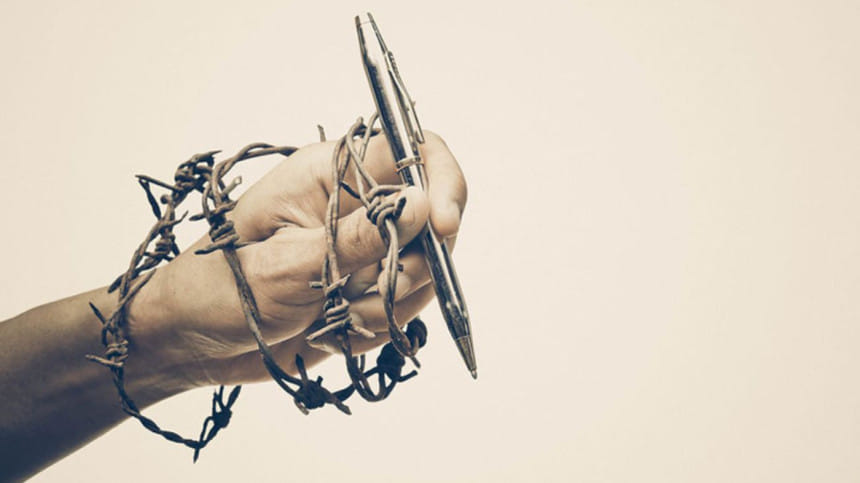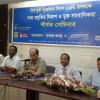World Press Freedom Day: Freedom of expression is good for business

Prime Minister Sheikh Hasina has set out an extremely ambitious vision to make Bangladesh a middle-income country by 2021, a higher middle-income one by 2030 and a "developed" one by 2041.
Her vision has a greater economic opportunity if Bangladesh can improve human rights situation as a positive reinforcement for investment. The once impoverished Bangladesh now has, according to the World Bank, one of the top five fastest growing economies in the world, in spite of poor foreign and private investment. Although regulations for businesses have loosened, the restrictions imposed on the right to freedom of expression have become tighter. The two are not at odds with each other: human rights do not stand in the way of Bangladesh's economic ambitions.
The notorious Information and Communication Technology Act—which the government itself acknowledged as flawed—was used to carry out thousands of arrests over a period of six years until last year. It was memorably invoked by the authorities last August when they arrested and detained the famed photographer and activist Shahidul Alam for more than 100 days. Instead of repealing the ICT Act, as the international community had long urged Bangladesh to do, the government introduced an even more draconian piece of legislation known as the Digital Security Act (DSA) in October 2018.
There has been widespread international criticism of the DSA, under which no fewer than 14 offences are non-bailable and punishment can be as high as life imprisonment if there's a repeat offence. Where people are punished for their peaceful views, and power can be exercised arbitrarily, some investors can become very wary.
Since the DSA came into force, the authorities arrested more than 60 people, mostly for exercising their right to freedom of expression on the internet, according to local newspapers. Last October, a human rights defender was arrested on charges of "defamation" and "undermining law and order" for merely posting a satirical image on Facebook. On New Year's Day this year, two journalists who reported on alleged election irregularities were charged with "spreading untrue information", "obtaining information illegally" and other offences.
The DSA hasn't even spared supporters of the ruling party, with a 21-year-old Awami League student activist arrested for posting a Facebook comment where he disavowed his religious beliefs. He faces seven years behind bars for supposedly "deteriorating law and order" and another five years for "hurting religious values and sentiments."
Under international human rights law, there can be legitimate reasons for restricting freedom of expression. But this should never lead to the punishment of people for their beliefs or the peaceful expression of their views.
This is what we are seeing in the latest phase of the crackdown, where online media spaces have been shut down for reasons that have nothing to do with combating discrimination or violence or serving other legitimate concerns. In February, Bangladesh's first and largest Bangla-language blogsite, "somewhereinblog", was shut down by the authorities during a crackdown on 20,000 pornography and gambling websites. In March, access to Al-Jazeera's website was temporarily blocked after the international news channel published an investigative report on enforced disappearances in Bangladesh. Joban, a Bangladeshi website that published an account of Al-Jazeera's report, remains blocked.
People are guaranteed the right to freedom of expression by the country's Constitution and by the International Covenant on Civil and Political Rights, to which Bangladesh is a signatory. It is a right that was integral to the country's struggle for independence, where speaking out against human rights violations carried out by Pakistani authorities became a moral imperative. It is a right that political parties knew the importance of when they were faced by repression under military rule.
At a time when Bangladesh is looking to attract greater foreign direct investment, the crackdown on freedom of expression and other human rights has not enhanced the country's international image. Some investors feel that lack of opportunity of the private sector to comment on proposed regulations and the government's sensitivities to public inputs on social media about developing regulations as impediments to investment, said the Bureau of Economic and Business Affairs of the State Department in July 2018.
The state of civil and political liberties are key insights that business intelligence and risk assessment firms offer to investors around the world. This is not just about the economic health of a country but also the political landscape and key freedoms—which determine stability, people's socio-economic lifestyle and the private sector's ability to reach out to the public.
One of the most effective tools for public outreach is the press. Businesses see growth potential when they are able to reach out to the public with their products and brands. Some of the most widely circulated newspapers in Bangladesh have suffered decline in revenues from advertisements since 2015.
Curbs on advertisement revenues restrains the capacity of the press to function freely or grow as institutions. Allegations of agencies instructing some of the top private corporations to stop providing advertisements to prominent newspapers in Bangladesh have been reported in 2015. The curbs remain in effect till date. This not only limits press freedom but also dwindles the opportunity of media institutions and the private sector to grow in the country.
The government would argue that media outlets—print, electronic and online—have exponentially increased in number since Prime Minister Sheikh Hasina came to power for a second time in 2009. The numbers have increased with more than 1,500 online news outlets, nearly 1,200 daily newspapers, 31 private television channels, 24 FM radio stations and 32 community radio, as put out by the Washington-based BGR public relations on behalf of the Awami League-led government.
The rise in the number of media outlets however, does not fill the gap in the diversity of opinion and the freedom to say or write whatever people want, without fear of reprisals. When the more prominent media institutions feel that their voices are being muzzled with fear of reprisals with repressive laws and increasing media surveillance, investors cannot reach out to people or the economy beyond a particular politically-subscribed audience.
Although the government has not fully shut down the critical press, restriction on advertisements to prominent newspapers, criminal cases against journalists and surveillance have limited the scope of its function. Most such press institutions survive primarily on subsidies from publishers and patrons, but they remain at the risk of being shut down if they are made to feel financially vulnerable. This also means that some media institutions, particularly those critical of the government, are not able to grow or reach their audience because of State agencies allegedly trying to exhaust their capacity by cutting revenue.
Bangladesh will be in a better position to attract foreign and private investment if it discourages security agencies from meddling into the functions of the press, amends or repeals the repressive provisions in the Digital Security Act, decriminalises defamation and releases all people arrested for peacefully exercising their right to freedom of expression.
Freedom of expression, the government will find, is actually good for business.
Saad Hammadi is Regional Campaigner for South Asia at Amnesty International.
His Twitter handle is: @saadhammadi

 For all latest news, follow The Daily Star's Google News channel.
For all latest news, follow The Daily Star's Google News channel. 






Comments